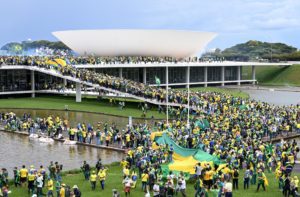The Mexican state of Sinaloa experienced a surge of violence and unrest last Thursday, January 5, following the arrest of high ranking member of the Sinaloa Cartel, Ovidio Guzman. Clashes broke out between security forces and cartel members with heavy fighting being heard around Culiacán, Sinaloa’s capital. Videos circulating on social media showed scenes of chaos and urban warfare, with cars on fire and armed men roaming the streets.
According to Defense Secretary Luis Cresencio Sandoval, Sinaloa Cartel gunmen first fired on Mexican army positions with six truck-mounted .50 caliber machine guns. The army responded by sending helicopter gunships to fire at the convoy. Two of the helicopters received heavy damage after being fired at and were forced to land. The city’s airport was then attacked by cartel members trying to prevent authorities from flying Guzman out of the state.
Additionally, several main roads and highways were blocked off by cartel members to slow down military traffic. Instances of looting were documented around parts of Culiacán and some locals have reported that cartel members seized their phones and cars at gunpoint. Schools and administrative activities were temporarily halted, and residents were advised to take shelter and remain indoors.
By the end of the day, 29 casualties were reported, with 10 being soldiers and the remaining 19 being identified suspects. Additionally, 35 military personnel were injured and 21 suspected gunmen were apprehended. In response to the escalating violence, the Mexican government deployed 3,500 additional soldiers to the region in order to prevent any further clashes. 26 armored vehicles, six .50-caliber machine guns, and 26 rifles were also captured following the operation.
Thursday’s violence in Sinaloa is reminiscent of similar scenes in 2019 following Guzman’s first arrest. His brief detainment led to widespread violence and unrest in the city, as an estimated 700 cartel members mobilized to secure his release. Several people were killed and many more were injured, with cartel members threatening further violence if Guzman was not freed. President Andrés Manuel López Obrador ultimately decided to release Ovidio Guzmán in order to avoid further loss of life.

Guzman, who is the son of notorious drug kingpin and former Sinaloa Cartel leader Joaquín “El Chapo” Guzmán, has been wanted by the United States for drug trafficking since 2018. Following his arrest on Thursday, he was flown to Mexico City where he awaits extradition.
The Sinaloa Cartel is widely regarded as the largest and most powerful drug trafficking organization in the world. The organization is based in Culiacán, where it maintains significant influence and is primarily involved in the distribution of cocaine, methamphetamine, heroin, and cannabis. The organization has gained a reputation for its extreme brutality and has been accused of perpetrating countless acts of murder, torture, and forced disappearances.
As of Friday morning, Culiacán International Airport was reopened and flights were resumed. Most burned cars and blockades were removed from the roads and public transportation began running again.
Cover image by: Juan Carlos Cruz / EFE







